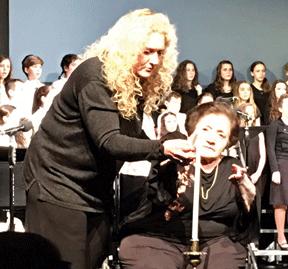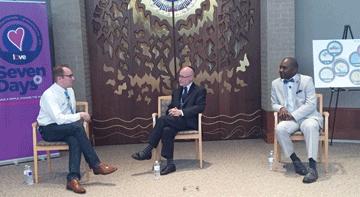
I get invited to a lot of events. In an effort to keep some sanity in my life, I try to rotate the events I attend. If I don’t make it one year, I try very hard to make it the next. One event I never miss is the Yom HaShoah Community Holocaust Commemoration. Now in its third year, I can say the same is now true for SevenDays.
The two events are very different, yet they have a lot of similarities. The one commonality is they both exist because of hate. One remembers the Holocaust that took place decades ago. The other was organized after hate crimes took the lives of three innocent people three years ago.
Through the many years of my association with The Chronicle, I have attended about a dozen Yom HaShoah commemorations. They never fail to move me, and I have no direct link to Holocaust survivors. I spoke to a 2G after the event — that’s what they call the second generation, the children of survivors. She told me she hates that day, yet I know she never misses it. I imagine she isn’t the only 2G, or 3G — grandchildren of survivors — that feels that way. Some heard the stories of their loved ones’ horrors all their lives, while others were sheltered from the information even as they knew their families, and even their own lives, would forever be affected by the Holocaust.
This year’s Yom HaShoah commemoration recognized the 74th anniversary of the Warsaw Ghetto Uprising and the 54th anniversary of the dedication of the Memorial to the Six Million. If you have never taken the time to get an up close look at the monument located on the Jewish Community Campus, you should. It is really incredible.
The Yom HaShoah program is comfortable in its sameness — I know we will hear a prelude of music from “Schindler’s List.” Ellen Kort, a 2G, played piano and Coleen Dieker, music director at The Temple, Congregation B’nai Jehudah, played the violin. It’s hauntingly beautiful. A 2G has chaired the event for the past several years, and this year we listened to Laurie Horn tell her father’s story of survival, escaping the Warsaw Ghetto and living in hiding for several years.
I marvel at the sight of young Scouts and senior Jewish War Vets presenting the colors together and the sound of the HBHA choir, whose members always sit on stage so very well behaved and respectful of the solemnity of the day. There were new faces this year as well, such as Cantor Benjamin Matis who sang “El Mole Rachamim.”
As Sharon Lindenbaum, board chair of the Jewish Community Relations Bureau|American Jewish Committee, said, we were there to remember the acts of bravery and the heroic struggle of the Warsaw Ghetto and to remember those who struggled and died.
Horn reminded us that when you know the stories of individuals, it makes history become real. She pointed to her father who liked to say, “Life is worth living, never give up.”
That brings me to SevenDays, which honors the memory of William Corporon, Reat Underwood and Terri LaManno, who were murdered in 2014 by an anti-Semite at Jewish sites. I believe the foundations established in their memories that sponsor these events — Faith Always Wins Foundation and LaManno-Hastings Family Foundation — came about because their loved ones know that life is worth living. Known officially as SevenDays — Make a Ripple, Change the World, it is a challenge for young and old to embrace diversity across race, religion and culture. The events hope to engage, enrich and enlighten participants and do so by promoting interfaith dialogue.

The past two years I attended the walk, which is the grand finale of SevenDays. This year I switched it up and attended the official opening, a celebration of faith. I wanted to hear the panel featuring a reverend, a rabbi and an imam. Every time I heard a sentence with those three words, I always waited for the punch line. But it wasn’t a joke at all and the three men — Rev. Scott Chrostek from Church of the Resurrection, Imam Sulaiman Zahir Salaam of the Al-Hagg Islamic Center and Rabbi Arthur Nemitoff from the host site The Temple, Congregation B’nai Jehudah — were very respectful of each other and the audience as they discussed “Commonalities Within Our Faiths.” (A side note, B’nai Jehudah’s chapel that seats 300 was nearly full, and only 40 people registered in advance.)
What I learned is the most common thread of all these religions, according to these wise and learned men, is love. Iman Salaam put it nicely: “The best way to show our love for God is to show our love to all human beings and his creations.” More than once we were reminded to “love your neighbor as yourself.” Following the presentation, the three clergymen came together for a group hug. I wish I had my camera out at that moment.
Gracie Schram won the $5,000 scholarship from the RRACE Foundation for her original song “Under the Sun.” She wrote, “We’re all just the same but a little bit different.” In addition to love, that was definitely the theme of the evening.
It was an inspiring evening. I was in both places because of hatred toward Jews. Both venues were filled with people, who I assume were there for the same reason I was. I will continue to support SevenDays because it is important to embrace our differences. We commemorate the Holocaust, we light six candles, we say Kaddish, because we must “Never Forget,” especially today as the news confirms that anti-Semitism in the United States is on the rise.
As I sat and listened to the minister, the rabbi and the imam, the Beatles lyrics “All you need is love” kept running through my mind. If only it were that simple. We can always hope.